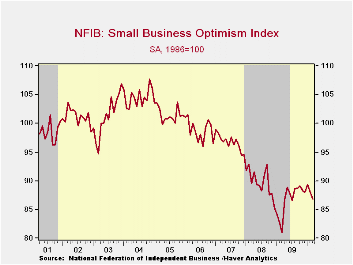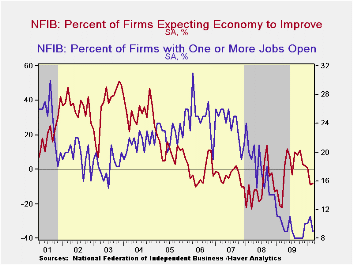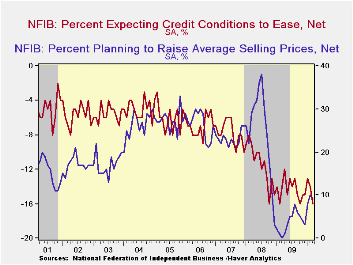 Global| Apr 13 2010
Global| Apr 13 2010U.S. Small Business Optimism Falls To Lowest Since July
by:Tom Moeller
|in:Economy in Brief
Summary
Economic recovery continued to do little to bolster small businesses' mood. The National Federation of Independent Business (NFIB) reported their March small business optimism index fell m/m to 86.8 which the lowest level since July [...]

Economic recovery continued to do little to bolster small businesses' mood. The National Federation of Independent Business (NFIB) reported their March small business optimism index fell m/m to 86.8 which the lowest level since July of last year. During the last ten years there has been an 85% correlation between the level of the NFIB index and the two-quarter change in real GDP.
Weaker figures on employment led the deterioration in last month's overall reading. The percent of firms with one or more job openings fell to its lowest since November and slightly fewer firms were planning to increase employment. Expectations for overall economic improvement remained near its lowest level since March of last year as a majority of firms saw further economic deterioration. Expectations for sales in six months fell back into negative territory and the percentage thinking that now was a good time to expand the business fell sharply to its lowest since in twelve months. Expectations for an easing of credit market conditions remained near the lowest since the Fall of 2008. The primary source of strength behind the numbers was that the percent of firms planning to raise inventory levels remained at the highest since early last year.
Hiring plans remain restrained. The percentage of firms with one or more job openings fell back to near the series' low and the percentage planning to increase hiring deteriorated. During the last ten years there has been a 74% correlation between the NFIB employment percentage and the six-month change in nonfarm payrolls.
On the pricing front weakness continued. The percentage of firms actually raising prices slipped to -20% (indicating deflation) and remained near the record low. During the last ten years there has been a 51% correlation between the six-month change in the producer price index and the level of the NFIB price index.Also, the percentage of firms planning to raise prices slipped from its highest level since late-2008. Finally, the percentage planning to raise worker compensation reversed half of its February improvement and fell to 3%.
The most important problems seen by business were poor sales (34%), taxes (a reduced 19%), government requirements (11%), insurance cost & availability (9%), competition from large businesses (a reduced 5%) and inflation (an increased 5%).
About 24 million small businesses exist in the United States. Small business creates 80% of all new jobs in America and the NFIB figures can be found in Haver's SURVEYS database.


| Nat'l Federation of Independent Business | March | February | January | March '09 | 2009 | 2008 | 2007 |
|---|---|---|---|---|---|---|---|
| Small Business Optimism Index (SA, 1986=100) | 86.8 | 88.0 | 89.3 | 81.0 | 86.7 | 89.8 | 96.7 |
| Percent of Firms Expecting Economy To Improve | -8 | -9 | 1 | -22 | -0 | -10 | -4 |
| Percent of Firms With One or More Job Openings | 9 | 11 | 10 | 10 | 9 | 18 | 24 |
| Percent of Firms Reporting That Credit Was Harder To Get | 15 | 12 | 14 | 12 | 14 | 9 | 6 |
| Percent of Firms Raising Avg. Selling Prices (Net) | -20 | -21 | -18 | -23 | -20 | 17 | 15 |
Tom Moeller
AuthorMore in Author Profile »Prior to joining Haver Analytics in 2000, Mr. Moeller worked as the Economist at Chancellor Capital Management from 1985 to 1999. There, he developed comprehensive economic forecasts and interpreted economic data for equity and fixed income portfolio managers. Also at Chancellor, Mr. Moeller worked as an equity analyst and was responsible for researching and rating companies in the economically sensitive automobile and housing industries for investment in Chancellor’s equity portfolio. Prior to joining Chancellor, Mr. Moeller was an Economist at Citibank from 1979 to 1984. He also analyzed pricing behavior in the metals industry for the Council on Wage and Price Stability in Washington, D.C. In 1999, Mr. Moeller received the award for most accurate forecast from the Forecasters' Club of New York. From 1990 to 1992 he was President of the New York Association for Business Economists. Mr. Moeller earned an M.B.A. in Finance from Fordham University, where he graduated in 1987. He holds a Bachelor of Arts in Economics from George Washington University.






